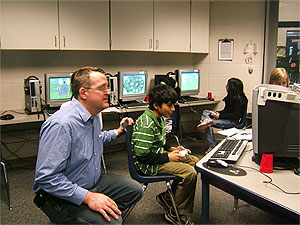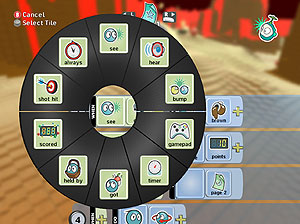REDMOND, Wash. – Jan. 12, 2010 – Microsoft is pushing to bring computer programming back into the classroom – and back into the realm of the imagination.
That push comes through Kodu, a game developed by Microsoft Research that invites users to create their own worlds while teaching them the basics of game development. Originally designed as a learning tool for youngsters using Xbox 360, Kodu is now available in a public beta for the PC. The move to the PC platform stands to make the game more attractive to schools. By eliminating the need for controllers, schools don’t need any special equipment – students can start building worlds with just a PC and a keyboard.
Through Kodu, Microsoft is introducing children to programming and helping them advance their design, math, and problem-solving skills, said Matthew MacLaurin, director of the Redmond FUSE (Future Social Experiences) Lab and the game’s creator. It also encourages students to truly engage with computers, instead of experiencing them passively.
“Today, it seems like the simple magic of programming has been completely lost in the shuffle,” MacLaurin said. “We need to show kids how exciting and creative it can be.”
With Kodu, budding developers string together simple and intuitive cartoon icons that define the rules of their game world, rather than using complex programming language. The result: Anyone from seven to 70 can create a game in minutes. Kodu was first unveiled in January 2009 at the International Consumer Electronics Show, and released that spring on Xbox LIVE Community Games. Since its release, Kodu has been downloaded more than 200,000 times, according to Microsoft.
The inspiration for Kodu came from MacLaurin’s daughter. A few years ago, MacLaurin noticed his daughter, then 3 years old, watching his wife browse her Facebook page. He flashed back to his early experiences with a computer, comparing the passive experience his daughter was having to the coding he did to interact with the machine. It was a sad realization, he said.

“Students would go tell their parents, ‘I never knew I could do this,’” says Scott Quibell, a parent who volunteers with the Kodu Club at Explorer Elementary School near Detroit. “They didn’t know they could create their own worlds and also learn the programming needed for their creations.”
“I think there’s a pretty common feeling that programming is when you directly get in touch with the magic that computers are capable of,” MacLaurin says. “For me and people of my generation, we were introduced to computers in that magical mode of creating something out of nothing through code.”
MacLaurin and his Microsoft Research team set out to recapture that magic. Through the basics of programming, they wanted to teach youngsters how they could create new worlds from their imagination. Two years later, Kodu was a hit on Xbox LIVE and was being used in more than 60 educational institutions across the globe to introduce children to programming.
One of those schools is Explorer Elementary, which is part of Kentwood Public Schools, near Grand Rapids, Mich. Originally envisioned as an after-school technology club, Explorer Elementary’s Kodu Club launched with an education and curriculum focus in the winter of 2009 after enormous interest from the students, said Scott Quibell, a parent who volunteers with the club.
“Students would go tell their parents, ‘I never knew I could do this.’ They didn’t know they could create their own worlds and also learn the programming needed for their creations,” Quibell says. “I don’t think all the kids are going to go into technology pursuits, but I think the creative experience is something they all need right now.” There is interest in expanding the program to the entire school district or a combination of elementary, middle school and high school options, he said.

Instead of using a complex programming language, Kodu lets budding developers string together simple and intuitive cartoon icons that define the rules of their game world.
The Department of Education and Early Childhood Development in Victoria, Australia, recently deployed Kodu in an extensive pilot program across 26 of its schools. Students there also are enthusiastic, says Richard Olsen, assistant director of ideasLAB, a research and development lab that explores what technology makes possible in schools. “As soon as I walked into a classroom with a big box of controllers, the kids looked at me like I was Santa,” he said. That enthusiasm continued throughout the three-month pilot. “I really believe that we learn and form knowledge by building things. The beauty of Kodu is that it’s so simple to create whole worlds, yet children gain these complex understandings.”
MacLaurin said he is pleased with the response to Kodu so far, and hopes more schools will be attracted to Kodu because of the PC release.
He also hopes a new generation of students will have the same magical experiences he did. “If you wind the clock back to the ‘70s and ‘80s, we talked about how software was going to change the world. Today, technology is changing the world, but we need to get that sentiment back into education. I think it’s good for Microsoft and for the world to open the door to programming more widely.”
To download the PC beta and get more information about Kodu, please visit http://fuse.microsoft.com/kodu/.




